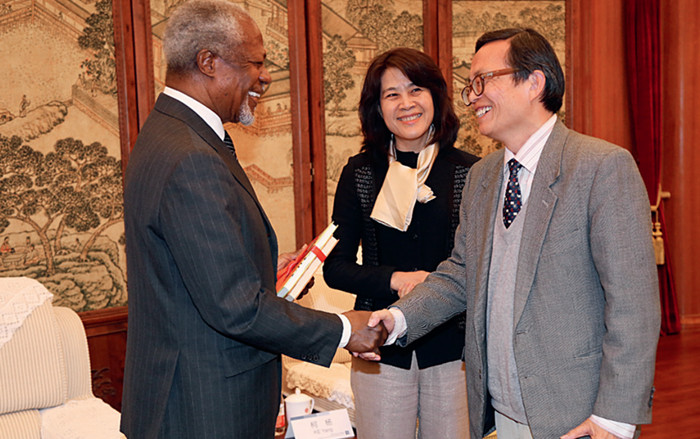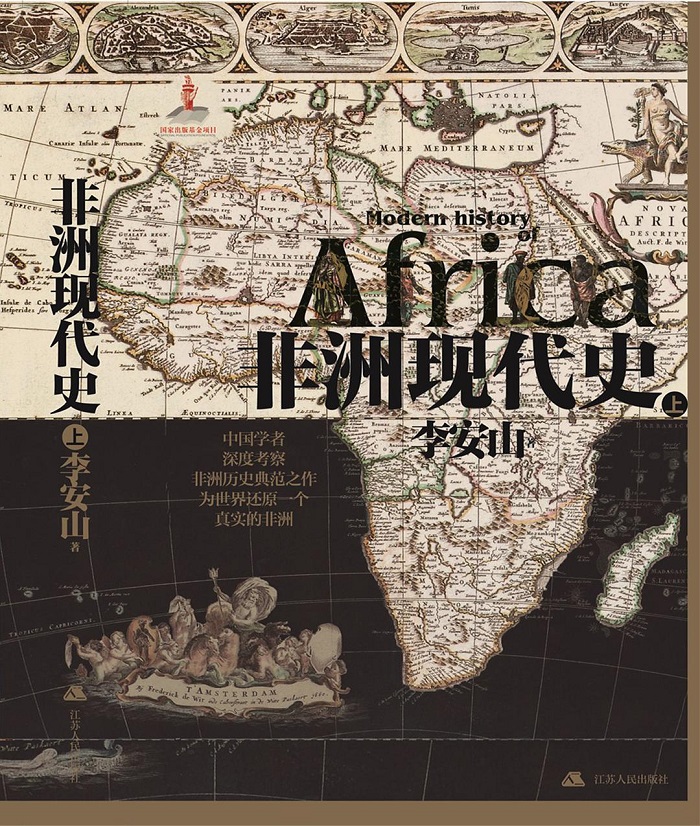|
||||||||||
| Home Nation World Business Opinion Lifestyle ChinAfrica Multimedia Columnists Documents Special Reports |
|
||||||||||
| Home Nation World Business Opinion Lifestyle ChinAfrica Multimedia Columnists Documents Special Reports |
| Highlights |
| A Passion for Studying Africa |
| A leading scholar of African studies attempts to interpret the continent’s modern history from a Chinese perspective in his new book |
| By LI XIAOYU 丨VOL. 14 JULY 2022 ·2022-06-28 |

Ke Yang (center), then Executive Vice President of Peking University and Li Anshan (right) present the book British Rule and Rural Protest in Southern Ghana to former UN Secretary-General Kofi Annan in 2015 (COURTESY)
For someone interested in modern history of Africa, there is a reason to update the reading list. Published in 2021, the book Modern History of Africa looks at the journey of the African people’s desire for freedom and nation-building from a Chinese viewpoint.
This voluminous book contains over 1 million Chinese characters (equivalent to 750,000 English words), and is one of the most notable works by Li Anshan, Professor Emeritus at Peking University, Adjunct Professor of University of Electronic Science and Technology of China, and President of the Chinese Society of African Historical Studies. One of China’s most experienced Africanists, he seeks to incorporate his 40-year academic experience in this book.
An objective look at Africa
In Li’s view, while the West has established a dominant position in the humanities and social sciences in modern times, it does not necessarily have the theoretical superiority. This is reflected in Roel van der Veen’s What Went Wrong with Africa (2004). The former Dutch diplomat asks why Africa has not been able to develop like the rest of the world. Instead of feeling guilty about the impact of colonization on Africa, he argues that“external factors cannot have been the overriding cause” and concludes that“the main reason for Africa’s disappointing level of development is the Africanization of colonial organizational structures.”In the face of such a Eurocentric perception, Li felt the need to observe and analyze African history from a Chinese perspective.“Chinese scholars are responsible for reviewing human history,”he argued.
The Chinese perspective, or an objective look at Africa’s historical evolution and involvement in the development of human civilization, is included in Modern History of Africa.“For a long time, Africa has been a‘lost’or‘forgotten’region in the view of Western researchers,”said Dong Zhenghua, Professor at Peking University’s Department of History.“The primary goal of this work is to correct such errors.”
To this end, Li masterfully balances theory and practice, past and present, accomplishments and obstacles, internal constraints and external interference, among other things, while taking political, economic, cultural, and ethnic variables into account. He thinks that by doing so, readers could better comprehend Africa as a whole and focus on its positive aspects.“Besides being the origin of mankind and the language, Africa has the oldest cave paintings and three of the oldest universities in the world,”Li said admiringly.
An experienced researcher
Data are vital sources for historical research. The fact that Li was able to cite hundreds of Chinese and foreign documents in his book is related to his long career in African studies.
Li was one of the first-generation students after the reopening of the Chinese university entrance examination system in 1977. In the second year after his admission to the English Department of Hunan Normal University, he picked Africa as the starting point for his interests in history. Wu Bingzhen, his M.A. supervisor at the Chinese Academy of Social Sciences’Institute of World History, invited scholars and researchers of the elder generation to teach him about African studies. This unique experience gave Li a solid foundation, which was strengthened by his doctoral studies under the supervision of Martin A. Klein, Professor of History at the University of Toronto, and former President of both the African Studies Association of America and the Canadian Association of African Studies.
In 1994, Li returned to China to teach at Peking University after his studies in Canada. His doctoral dissertation on rural social resistance during British colonial rule in Ghana, published in Chinese and English, was presented by Peking University to former UN Secretary-General Kofi Annan, who is Ghanaian. Throughout his academic career, Li has held academic talks and lectures in over 30 countries on five continents, in addition to writing a number of publications. He led a Chinese Ministry of Foreign Affairs delegation to Africa to review how the outcomes of the Forum on China-Africa Cooperation were being implemented. In November 2013, his seniority and professional experience earned him the position of vice chairman of the International Scientific Committee of UNESCO’s General History of Africa (Vol. IX, later expanded to IX-XI).
African studies in China
Scholars are unquestionably important players in Sino-African cooperation. Although African studies are not new in China, they are still lacking in depth and breadth, Li remarked. As a result, he recommends Chinese academics to learn truly and humbly from their overseas peers, particularly African academics.
Li, on the other hand, sees a major improvement in China’s research environment. International visits were rare when he began his studies.
Today, the situation has changed, with an increase in academic exchanges and the expansion of fields of study. At the first Conference on Dialogue Between Chinese and African Civilizations held on April 9 in Beijing, Li recalled in his opening speech the similarities between the two civilizations and their mutual learning.“The topics exceed research horizons of my early career,” he told ChinAfrica.
To his delight, he has seen a growing number of young Chinese scholars engaging in African studies. According to data provided by Zhan Shiming, a researcher at the China-Africa Institute, there are currently about 70 institutes in the country, whose research areas focus on African current affairs and Sino-African relations. Established in 1980, the Chinese Society of African Historical Studies is one of them, with Li as its fourth president. There are now more than 300 members. These researchers come from all walks of life and contribute to African studies in China through various research projects.
“Many similarities exist between China and Africa, creating ideal settings for academic exchanges. In reality, this lays the groundwork for increasing China-Africa cooperation, which has a bright future ahead of it,”Li said.

Modern History of Africa (2021) aims to analyze African history from a Chinese perspective (COURTESY)
Li Anshan’s Key Works
• British Rule and Rural Protest in Southern Ghana (Changsha 1999; New York 2002)
• A History of Chinese Overseas in Africa (Beijing 2000)
• A Study on African Nationalism (Beijing 2004)
• Chinese Medical Cooperation in Africa: With Special Emphasis on the Medical Teams and AntiMalaria Campaign (Uppsala 2011)
• A History of Overseas Chinese in Africa to 1911 (New York 2012)
• The African Dream: In Search of the Road to Modernization (Nanjing 2013)
• The Social and Economic History of the Chinese Overseas in Africa (Nanjing 2019)
• Modern History of Africa (Nanjing & Shanghai 2021)
• China and Africa in Global Context: Encounters, Policy, Cooperation and Migration (Routledge 2022)
|
||||||||||||
| About Us | Contact Us | Advertise with Us | Subscribe |
| Copyright Beijing Review All rights reserved 京ICP备08005356号-5 京公网安备110102005860号 |